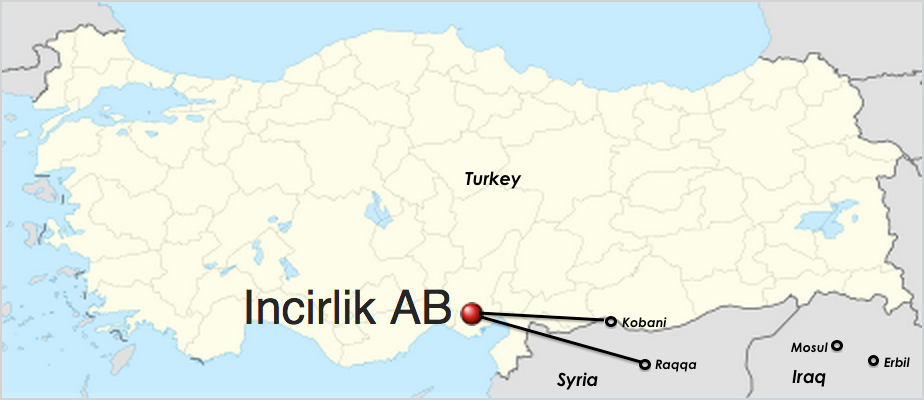[Note: This article is from October 2014. For July 2015 news and maps about this topic, see here.]
Amid mounting pressure from the Obama Administration, the Turkish government appeared briefly to have decided to allow the famous Incirlik Air Base near Adana, Turkey, to be used for coalition bombing of ISIS positions in Syria.

Map of Turkey’s Incirlik Air Base relative to Kobani, Raqqa, Mosul, and Erbil. (Adapted from Wikipedia)
Such a decision would allow the U.S.-led mini-coalition on Syria, which had been flying from air bases and ships in Bahrain and the Persian Gulf, to dramatically shorten both the overall flight time of bombing runs to Syria (particularly northern Syria), but it would also mean the distance flown over hostile airspace specifically is significantly shorter. Airstrike missions to the embattled Syrian border town of Kobani, for example, could be flown almost entirely through friendly airspace until the final moments.
The bases would also be used for air operations in northern and western Iraq by the much larger coalition that includes several other NATO members and Australia, all of whom did not feel comfortable intervening in Syria without a UN resolution or government request for assistance.
***
Update: Hours later, Turkey’s government denied any deal on air bases had been reached and insisted that the old demands regarding a wider intervention in Syria were still on the table.
A day after American officials said Turkey had agreed to allow its air bases for operations against the Islamic State, which they described as a deal that represented a breakthrough in tense negotiations, Turkish officials on Monday said there was no deal yet, and that talks were still underway.
The Turkish comments represented another miscommunication between the United States and its longtime ally Turkey, as President Obama pushes to strengthen an international coalition against the militants that control a large area of both Syria and Iraq, by securing a greater role for Turkey.
The Turks have insisted that any broad support for the coalition is dependent on the mission’s going beyond just the Islamic State, also called ISIS or ISIL, to also target the Syrian government of Bashar al-Assad, which Turkey has long opposed and blames for creating the conditions that led to the rise of the extremists within Syria and Iraq.
***
Incirlik Air Base, which is a major staging center for both the Turkish Air Force and the U.S. Air Force, has been a cornerstone for American and NATO military operations all around Europe, the Middle East, North and East Africa, Southwest Asia, and (during Cold War surveillance flights) the Soviet Union, since the 1950s. Previously, it has been most notably used for U.S. missions in Lebanon (1958), Iraq (for Desert Storm and the subsequent no-fly zone), and Afghanistan (2001).
Although the base is heavily dominated by the U.S. Air Force, Turkey’s government has not always seen eye to eye with the United States government and is allowed to deny its use for missions that are not part of direct NATO operations, if they oppose the operation.
Most recently, the U.S. was denied the use of Turkish air bases for the 2003 invasion of Iraq (they ultimately decided to authorize only the use of Turkish airspace), and there was concern about whether the same decision would be made on the U.S.-led coalition operations in Syria right now. But probably the biggest example was when the Turkish government closed the base to the U.S. Air Force for everything except NATO activities after a Congressional embargo on Turkey over their 1974 invasion of northern Cyprus.
This post has been updated to reflect the reversed decision by Turkey’s government.


